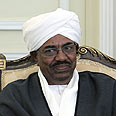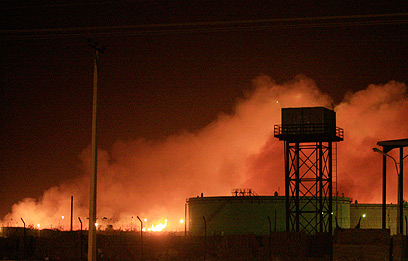
Sudanese opposition calls for mass protests against Bashir
'We expect weak regime will fall in 100 days,' umbrella organization of main opposition parties says
Sudan's main opposition movement called on Saturday for mass protests to topple President Omar Hassan Bashir, saying regional rebellions and an economic crisis had left the veteran leader weak and unpopular.
Bashir's opponents have failed to capitalize on popular discontent over soaring food prices since South Sudan broke away in 2011, taking most of the country's oil production with it.
Related stories:
- Analysis: Khartoum flames seen in Iran
- Sudanese VP: Israel needs to be deterred
- Sudan blames 'Zionist-US plot' for unrest
Uprisings that shook the Arab world that year have largely passed Sudan by, the security forces descending quickly on frequent small street protests by students before they have a chance to spread.
Bashir, who came to power in 1989, still enjoys the support of the army and influential Islamist groups. He crushed challengers to his rule in a 2010 election and dismisses the opposition parties as insignificant.

Weapons facility in Sudan reportedly attacked by Israel (Archive photo: Reuters)
The National Consensus Forces, an umbrella of the main opposition parties, said they had decided to call for mass protests because the government was fast losing support. They said Bashir could be out of power within three months.
"The regime is very weak... We will begin today and in the next days to prepare popular demonstrations," Farouk Abu Issa, head of the alliance, told reporters. "We expect that the regime will fall in 100 days."
Abu Issa said the protests would start in Khartoum and the city of Omdurman across the Nile and then spread to large university cities. He gave no further details.
There was no immediate comment from the Khartoum government.
Some critics of the opposition say its leadership fails to pose a real challenge to the authorities because it is more absorbed by political rivalries and internal squabbling.
Several opposition figures, such as Hassan al-Turabi, have past connections to Bashir, sapping the opposition's credibility among many Sudanese.
The opposition has changed tack this year, announcing in January that it would coordinate with an alliance of rebel groups trying to topple Bashir from their strongholds in the western region of Darfur and two southern border states.
Abu Issa said the opposition was working with the rebel alliance, the Sudanese Revolutionary Front (SRF), even though it opposes its violent tactics.
"The SRF is our strategic partner. We don't agree with them on using military means ... but we share the same goal of bringing down the regime," he said.
One of the members of the SRF is Darfur's Justice and Equality Movement (JEM), which attacked Khartoum in 2008.
The SRF launched a major assault on central Sudan in April as it tries to move the front closer to Khartoum and force the army to fight on several fronts in what they see as a war of attrition.
- Receive Ynetnews updates directly to your desktop










